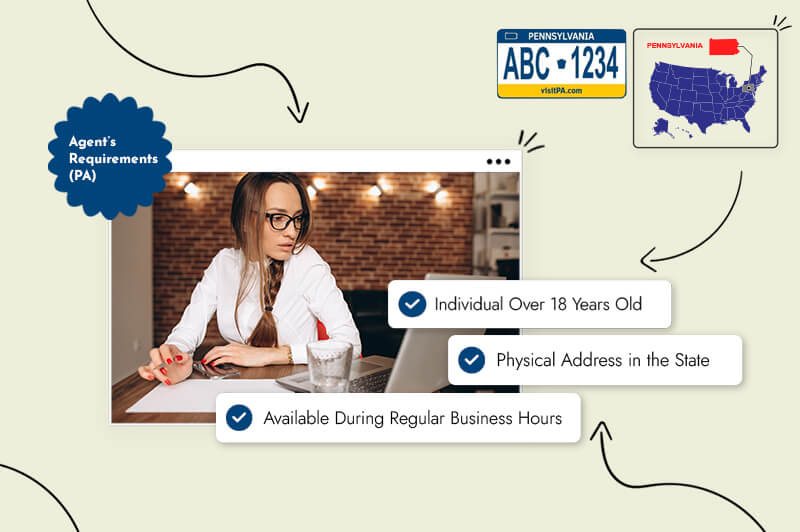Many states require the designation of a Registered Agent in order to register a business. Pennsylvania does not.In Pennsylvania, every LLC or corporation must list a registered office or contract with a Commercial Registered Office Provider (CROP). This is the official address where the Commonwealth and courts can deliver legal and government correspondence.When planning your business formation, account for state filing fees and related expenses detailed in the LLC cost in PA.
What is a Pennsylvania registered office?
A registered office is the physical Pennsylvania address, or the name of a contracted provider, that an entity places on file so it can reliably receive lawsuits, agency notices, and other official mail. Pennsylvania law does not use the term “registered agent.” The requirement and options are set out in 15 Pa.C.S. §109. In most other states, this same responsibility belongs to a registered agent.

Registered office requirements
The state of Pennsylvania requires LLCs to be physically reachable during business hours, but The registered office ensures your business can always receive:
- Service of process for lawsuits
- State and federal tax notices and permit renewals
- Official correspondence from agencies
- Compliance reminders, including the Commonwealth’s new annual report requirement described in the Pennsylvania LLC annual report
Timely delivery helps you avoid missed deadlines, penalties, or default judgments.
Requirements for a registered office

To meet Pennsylvania’s requirement, your business must list either a Pennsylvania street address that it maintains as its registered office, or the name of a Commercial Registered Office Provider with whom you have an agreement. Post office boxes are not acceptable. The registered office must be reachable during normal business hours so service of process and official mail can be accepted.You file and manage these details through the Commonwealth’s portal, Pennsylvania Business Filing Services (BFS), and you can find general information on the Bureau site at PA Department of State, Corporations Bureau.
Can I be my own registered office in Pennsylvania?
Yes, you can be your own registered agent/office in Pennsylvania as long as you live in the state and meet the qualifying criteria. However, the state requires a registered office to have operating hours from Monday through Friday and have someone available to receive Yes, if you maintain a Pennsylvania street address and are available there during standard business hours. Many owners prefer to use a professional provider for privacy and reliability. If you want a done-for-you option, consider our registered office service.
If you choose to self-designate, remember your address will be public and you must be consistently available to receive documents.
How to appoint a registered office?
You appoint your registered office when you file your LLC’s Certificate of Organization or your corporation’s Articles of Incorporation. On the filing, list either your Pennsylvania street address as the registered office or the name of your contracted CROP. You do not submit the contract itself, but you must have consent from the provider before listing them.
If you’re still in the process of getting an LLC in Pennsylvania, this step is part of your initial state filing and must be completed before your business can be approved.
How to change my registered office?
You can change your registered office or CROP online through Pennsylvania Business Filing Services (BFS) or by mail. The filing carries a $5 fee. Make sure forms are typed clearly, payments meet the Department’s requirements, and your provider has consented if you are switching to a CROP.
Benefits of using a Pennsylvania registered office service

Peace of mind
The likelihood of being served with papers or receiving government correspondence is small but not negligible. Using a Pennsylvania registered office service ensures someone is always available to receive important documents and notices, so you can focus on running your business without worry.
Privacy
Listing yourself, a friend, or a family member as the registered office exposes personal information to the public. Every registered office address appears in the state’s business records. By using a Commercial Registered Office Provider (CROP), your provider’s address is listed instead, helping protect your privacy.
Compliance with the state law
Pennsylvania law requires every LLC and corporation to maintain a registered office under 15 Pa.C.S. §109. If you’re unable to maintain your own physical address during business hours, you can contract with a CROP to meet this requirement. Many providers also offer compliance reminders for filings such as the annual report to help your business stay in good standing.
Flexibility
A registered office service allows you to travel, meet clients, or take time away from your desk without missing important deliveries or deadlines. Your CROP is available during regular business hours to receive documents on your behalf.
Reduces paperwork
Some CROPs help track and manage compliance paperwork, ensuring forms are submitted to the Pennsylvania Department of State on time. This minimizes administrative work and helps you avoid penalties for missed filings.
Conclusion
Pennsylvania does not use registered agents. To operate in good standing, every entity must maintain a registered office or appoint a CROP. You may self-designate if you have a Pennsylvania street address and are available during business hours, or you can hire a professional provider for convenience, privacy, and reliability.
FAQ
Yes. You must list either a Pennsylvania street address as your registered office, or the name of a CROP, when you file.
No. A physical street address in Pennsylvania is required under 15 Pa.C.S. §109.
Use Pennsylvania Business Filing Services (BFS).
Yes. You can update your registered office or change your Commercial Registered Office Provider (CROP) by filing the appropriate form with the Pennsylvania Department of State either online through Business Filing Services (BFS) or by mail. The filing carries a $5 fee.


